Smart Ports Market Research, 2032
The global smart ports market was valued at $2.0 billion in 2022, and is projected to reach $15.5 billion by 2032, growing at a CAGR of 23.1% from 2023 to 2032.
Report Key Highlighters:
- The report provides competitive dynamics by evaluating business segments, product portfolios, target market revenue, geographical presence and key strategic developments by prominent manufacturers.
- The smart ports market is consolidated in nature among prominent companies such as Royal Dutch Shell, Cisco System, Inc., KONGSBERG, ABB Ltd., Huawei Technologies Co., Ltd., Kaleris, IBM Corporation, Trelleborg, Intel Corporation, and Abu Dhabi Ports.
- The study contains qualitative information such as the market dynamics (drivers, restraints, challenges, and opportunities), key regulation analysis, pricing analysis, and Porter’s Five Force Analysis across North America, Europe, Asia-Pacific, LAMEA regions. Moreover, the report covers sub-segments that is studied across all the regions.
- Latest trends in global smart ports market such as undergoing R&D activities, public policies, and government initiatives are analyzed across 16 countries in 4 different regions.
- More than 3,500 smart ports-related product literatures, industry releases, annual reports, and other such documents of key industry participants along with authentic industry journals and government websites have been reviewed for generating high-value industry insights for global smart ports market.
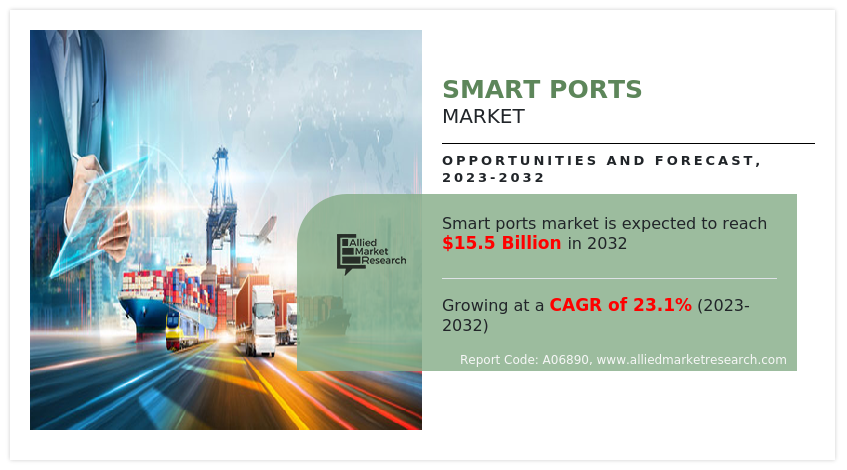
Smart ports, also known as intelligent or digital ports, represent a transformative paradigm in the maritime industry. These ports harness the power of advanced technologies, data analytics, and AI to enhance efficiency, safety, sustainability, and overall operational performance. Smart ports create a seamless and intelligent ecosystem that optimizes cargo handling, logistics, and communication among stakeholders by integrating various interconnected systems and leveraging real-time data.
At the core of a smart port is the concept of digitalization, which involves capturing and processing vast amounts of data from multiple sources within the port and its surrounding environment. Sensors, Internet of Things (IoT) devices, and other smart technologies monitor various aspects such as vessel movements, container tracking, weather conditions, and equipment performance. This real-time data forms the foundation for smart decision-making and operational optimizations.
One of the primary drivers of the smart ports market is the pursuit of operational efficiency. Smart port solutions offer streamlined cargo handling processes, optimized container tracking, and automated operations. This increased efficiency leads to reduced turnaround times for vessels, faster clearance for goods, and ultimately cost savings for port operators and shippers. Moreover, the proliferation of digital technologies, such as the Internet of Things (IoT), AI, blockchain, big data analytics, and automation, has played a crucial role in the evolution of traditional ports into smart ports. These technologies enable ports to gather and analyze vast amounts of data, leading to data-driven decision-making, predictive maintenance, and enhanced operational intelligence.
Furthermore, global trade continues to grow, necessitating the need for ports to handle larger volumes of cargo efficiently. Traditional ports have chances to struggle to cope with this increase in demand, leading to congestion and delays. Smart port technologies help address these challenges by enhancing capacity management, optimizing resource allocation, and streamlining processes. These factorsre responsible for the smart ports market growth.
However, implementing smart port technologies requires a substantial upfront investment in hardware, software, and infrastructure. For some port operators, especially those in developing regions or smaller ports, the initial costs may be prohibitive, delaying or limiting their adoption of smart solutions.
On the contrary, many governments recognize the potential of smart ports in driving economic growth and promoting trade. They may offer incentives, grants, or supportive policies to encourage the adoption of smart port technologies; thus, creating remunerative opportunities for the smart ports market.
The smart ports market is segmented on the basis of technology, throughput capacity, port type, and region. On the basis of technology, the market is categorized process automation, blockchain, Internet of Things (IoT), and AI. On the basis of throughput capacity, the market is divided into extensively busy, moderately busy, and scarcely busy. On the basis of port type, the market is bifurcated into seaport and inland port. On the basis of region, the market is studied across North America, Europe, Asia-Pacific, and LAMEA.
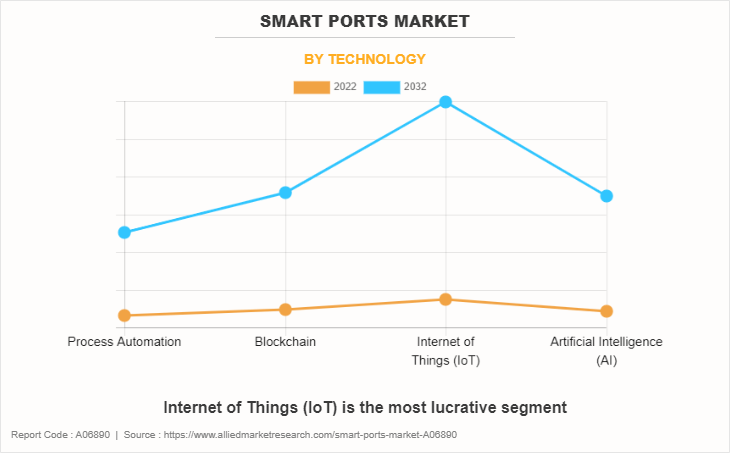
In 2022, the Internet of Things (IoT) segment was the largest revenue generator, and is anticipated to grow at a CAGR of 23.2% during the forecast period. IoT sensors attached to containers, vehicles, and cargo allow real-time tracking and monitoring of their movements within the port premises and throughout the supply chain. This provides better visibility into cargo status, location, and condition, facilitating more efficient logistics operations. IoT sensors are deployed on port equipment, such as cranes, trucks, and handling machinery, to monitor their performance, health, and usage. Real-time data helps in predictive maintenance, reducing downtime, and optimizing equipment utilization. These factors altogether may surge the adoption of IoT technology in the smart ports market.
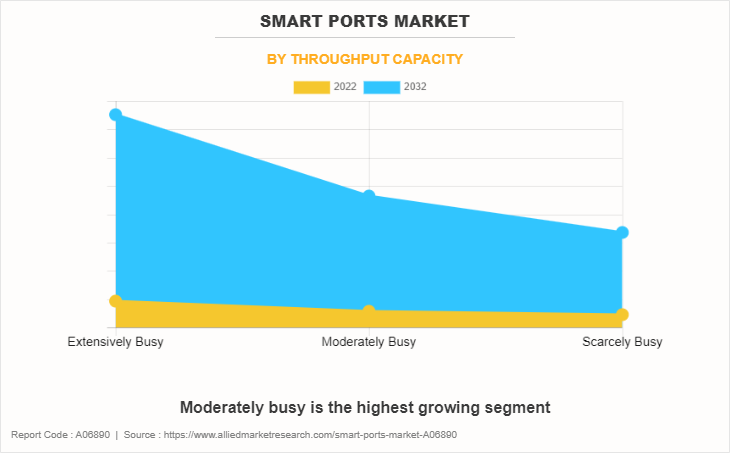
On the basis of throughput capacity, the extensively busy segment dominated the global market in 2022 and is anticipated to grow at a CAGR of 23.1% during the forecast period. Implementing AI-powered autonomous vehicles and machinery can further optimize cargo handling processes. These autonomous systems can work collaboratively, adapt to changing conditions, and operate around the clock, increasing overall efficiency. Furthermore, in extensively busy smart ports, the successful implementation of AI technologies can be a contributor of smooth and fast port operation, driving higher efficiency, cost-effectiveness, and improved customer experiences while meeting the challenges of managing large-scale operations. This factor is the major key market trend in the global smart ports market for extensively busy smart ports.
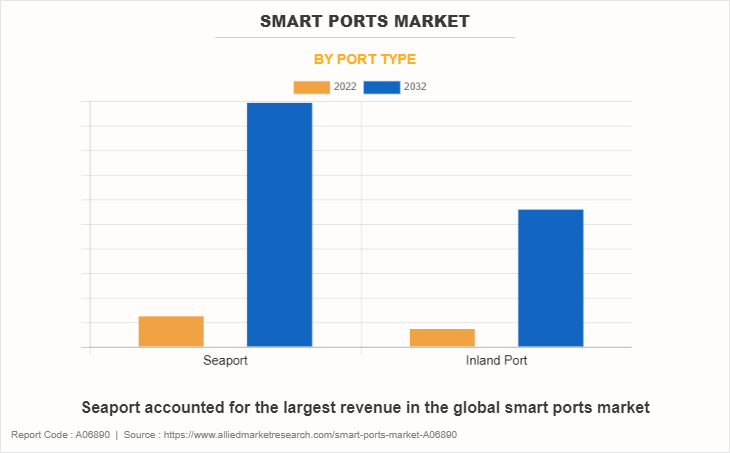
On the basis of port type, the seaport segment dominated the global market in 2022 and is anticipated to grow at a CAGR of 23.2% during the forecast period. Seaport smart ports use AI-driven robotic and autonomous systems for the efficient handling of cargo. Automated cranes, gantries, and robotic vehicles ensure faster loading and unloading of containers, reducing turnaround times for vessels. Furthermore, seaport smart ports are at the forefront of the digital transformation in the maritime industry. Smart ports are able to easily handle increase in cargo volumes, improve resource utilization, enhance security, and foster sustainable practices, by integrating AI and advanced technologies, which in turn may enhance the overall performance of smart ports in global trade and logistics.
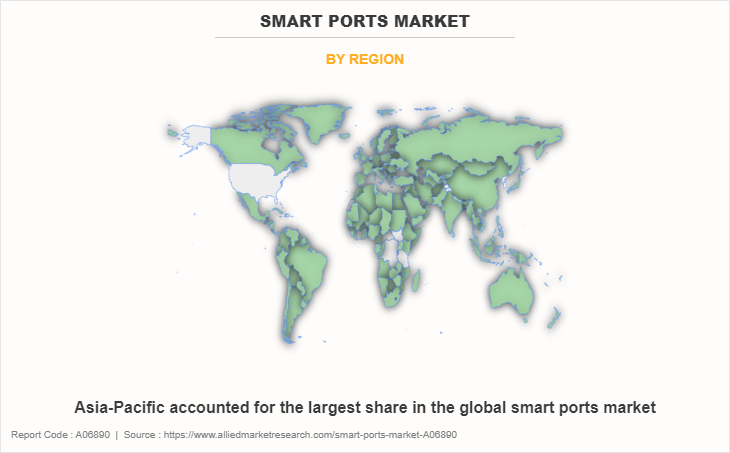
The Asia-Pacific smart ports market size is projected to grow at the highest CAGR of 24.3% during the forecast period and accounted for 39.3% of smart ports market share in 2022. Asia-Pacific has been a leading region in adopting smart port technologies. Countries like China, Singapore, Japan, South Korea, and Australia have been at the forefront of integrating IoT, AI, automation, and big data analytics into their ports to enhance efficiency and competitiveness.
Economic growth of the region and increase in trade volumes have necessitated the need for efficient and technologically advanced ports. Smart port solutions have offered Asian ports the means to handle the growth in trade demand effectively. Moreover, governments and port authorities in Asia-Pacific have been prioritizing digital transformation initiatives. These initiatives aim to streamline port operations, improve cargo handling, and provide real-time data insights for better decision-making.
The global smart ports market profiles leading players that include Royal Dutch Shell, Cisco System, Inc., KONGSBERG, ABB Ltd., Huawei Technologies Co., Ltd., Kaleris, IBM Corporation, Trelleborg, Intel Corporation, and Abu Dhabi Ports. The global smart ports market report provides in-depth competitive analysis as well as profiles of these major players.
Key Benefits For Stakeholders
- This report provides a quantitative analysis of the market segments, current trends, estimations, and dynamics of the smart ports market analysis from 2022 to 2032 to identify the prevailing smart ports market opportunities.
- The market research is offered along with information related to key drivers, restraints, and opportunities.
- Porter's five forces analysis highlights the potency of buyers and suppliers to enable stakeholders make profit-oriented business decisions and strengthen their supplier-buyer network.
- In-depth analysis of the smart ports market segmentation assists to determine the prevailing market opportunities.
- Major countries in each region are mapped according to their revenue contribution to the global market.
- Market player positioning facilitates benchmarking and provides a clear understanding of the present position of the market players.
- The report includes the analysis of the regional as well as global smart ports market trends, key players, market segments, application areas, and market growth strategies.
IMPACT OF COVID-19 ON THE GLOBAL SMART PORTS MARKET
- There were widespread disruptions in global supply chains, affecting the flow of goods and cargo through smart ports during the early stages of the pandemic. Lockdowns, restrictions, and reduced workforce availability led to delays in cargo handling and transportation.
- However, as lockdowns and restrictions eased in many regions, economic activities started to rebound. This led to an increase in global trade and cargo volumes, benefiting smart ports. Moreover, during the pandemic, there was a surge in demand for essential goods such as medical supplies and food. Smart ports adapted to manage the increased volumes of these goods.
- Moreover, the pandemic highlighted the importance of digitalization and automation in port operations. Many smart ports accelerated their digital transformation efforts to improve efficiency, reduce manual interventions, and enhance overall resilience. Furthermore, the pandemic reinforced the need for reduced dependence on manual labor in port operations. Automation and AI technologies continued to be adopted to improve efficiency and reduce human-intensive tasks. These factors altogether are anticipated to drive the growth of the smart ports market during the forecast period.
Smart Ports Market Report Highlights
| Aspects | Details |
| Market Size By 2032 | USD 15.5 billion |
| Growth Rate | CAGR of 23.1% |
| Forecast period | 2022 - 2032 |
| Report Pages | 410 |
| By Technology |
|
| By Throughput Capacity |
|
| By Port Type |
|
| By Region |
|
| Key Market Players | Huawei Technologies Co., Ltd., Kaleris, ABB Ltd., KONGSBERG, IBM Corporation, Abu Dhabi Ports, Cisco System, Inc., Trelleborg, Intel Corporation, Royal Dutch Shell |
Analyst Review
The global smart ports market is expected to exhibit high growth potential, owing to the implementation of smart port technologies that provide a competitive edge in the rapidly evolving maritime industry. Smart ports offer faster turnaround times, optimized operations, and improved customer experiences, attracting more shipping lines and cargo owners. In addition, smart port solutions, driven by AI, IoT, and automation, lead to increased efficiency and reduced operational costs. Smart ports can maximize productivity while minimizing expenses by optimizing resource allocation, predictive maintenance, and traffic flow. Furthermore, smart ports generate vast amounts of data from various sources. Leveraging this data through advanced analytics allows CXOs to make informed decisions, identify areas for improvement, and implement data-driven strategies for growth.
Furthermore, CXOs added that sustained economic growth coupled with increase in trade volumes may lead the smart ports market to witness significant growth in the coming future
Technological advancements, operational efficiency, environmental sustainability, rising trade volumes, and real-time information and visibility are the upcoming trends of smart ports market in the world.
The leading application of smart ports is optimized parking space, traffic control, data monitoring, and others.
Asia-Pacific is the largest regional market for smart ports.
The global smart ports market was valued at $2.0 billion in 2022, and is projected to reach $15.5 billion by 2032, growing at a CAGR of 23.1% from 2023 to 2032.
Royal Dutch Shell, Cisco System, Inc., KONGSBERG, ABB Ltd., Huawei Technologies Co., Ltd., Kaleris, IBM Corporation, Trelleborg, Intel Corporation, and Abu Dhabi Ports are the top companies to hold the market share in smart ports market.
Loading Table Of Content...
Loading Research Methodology...


